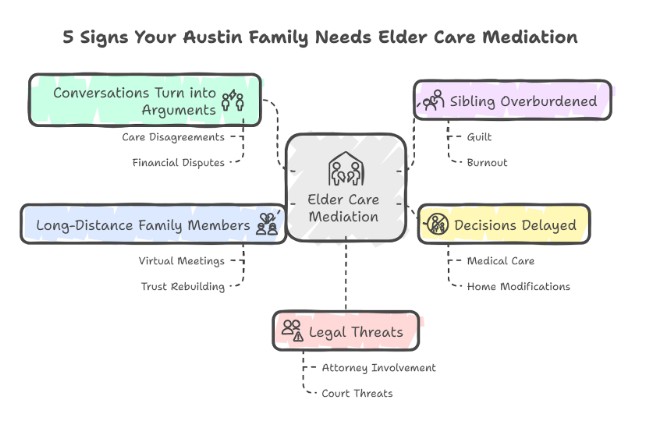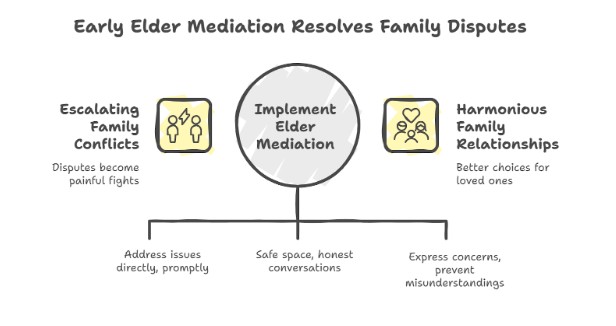Call Now For Service!
Originally published: August 2025 | Updated: September 2025 | Reviewed by Kim Torres

When aging parents need more care, even the closest Austin families can end up in painful conflict.
What starts as concern for mom’s safety or dad’s finances sometimes spirals into heated sibling arguments.
Elder care mediation can help families resolve these disputes before relationships suffer or care gets delayed.
Mediators bring relatives together and understand both the emotional challenges and practical choices aging brings.
Spotting the warning signs early saves Austin families from expensive legal battles and heartbreak.
If family discussions keep ending in fights, if one sibling feels overwhelmed by responsibilities, or if decisions stall because nobody agrees, elder mediation keeps the focus on what matters—your loved one’s well-being.

When every conversation with aging parents turns into an argument, there’s usually a deeper problem.
These patterns tend to emerge most frequently during discussions about health, finances, or where someone should reside.
Family members may notice that even simple topics can become heated quickly.
Maybe a gentle suggestion about a doctor’s visit becomes a shouting match about independence.
Warning Signs Include:
Communication breakdowns are obvious when tensions rise and people avoid important conversations.
Everyone ends up frustrated and drained, and nobody feels heard.
Elderly parents may feel as though they’re losing control, while adult children worry about their safety.
Both sides often talk past each other.
These conflicts block families from making real progress on elder care decisions.
| Common Triggers | Typical Reactions |
| Medical concerns | Denial or anger |
| Driving safety | Defensiveness |
| Home modifications | Resistance |
| Financial planning | Suspicion |
If you spot these patterns, it’s time to try something different. Professional mediation can help families break the cycle and actually start listening to each other.

When one family member becomes the primary caregiver, things can escalate quickly.
Caregiver sibling resentment is a genuine concern, particularly when care duties predominantly fall on one person.
This builds up frustration and sometimes even anger.
The sibling who handles most of the tasks—such as scheduling appointments, managing medications, or making financial calls—can feel overwhelmed.
The situation worsens when other siblings fail to step up. Some families expect more from one sibling, which just isn’t fair.
The overwhelmed sibling might notice:
| Physical Signs | Emotional Signs |
| Constant tiredness | Anger toward siblings |
| Health problems | Feeling isolated |
| Sleep issues | Depression or anxiety |
Siblings get overwhelmed as their parents’ health declines, and that stress makes everything harder.
The resentful sibling might start skipping family get-togethers or making sharp comments about being left to deal with everything alone.
Sometimes, they just stop talking to their brothers and sisters. Distance and communication breakdowns become the new normal.
The caregiver feels abandoned, right when they need help the most. A mediator can help families share the load more fairly, so nobody burns out.
Tension building over elder care decisions? Torres Mediation helps Austin families work through conflict calmly and constructively. Contact us today to explore elder mediation options.
If you’re ready to get started, call us now!
When families can’t agree on major decisions, the older adult often ends up paying the price.
Delays about care, living arrangements, or medical treatment leave parents stuck in limbo.
Healthcare decisions become more urgent as people age. Waiting weeks or months to choose a doctor or care facility can exacerbate health problems.
Common decisions that stall out include:
Some situations can’t wait. If a parent just had surgery, they need decisions now—not next month.
Dragging things out only creates more stress. Parents often feel helpless and anxious when their future is uncertain.
They might worry about being a burden or losing their independence. Meanwhile, family arguments just slow things down even more.
One sibling wants to keep mom at home, another pushes for assisted living, and time keeps ticking.
Mediators can help families make decisions more quickly, focusing on what’s best for the parent, not personal preferences.
Clear timelines keep things moving.
Mediators help families set deadlines and action plans, ensuring that important choices don’t remain stuck in limbo forever.
Resentment and delays can cause long-term damage. Torres Mediation offers a structured way to address elder care issues before relationships break down. Schedule your session now.
If family members live far from Austin, they often struggle to stay involved in care decisions.
Distance makes it easy for misunderstandings and resentment to creep in.
Common Signs of Distance-Related Tensions:
Those living nearby witness the daily struggles, while distant relatives simply don’t understand the extent of the help needed.
Remote family members can feel guilty about not being there, and that guilt sometimes turns into criticism.
They might challenge spending or care decisions without knowing the full story.
Feeling left out by family hurts—local caregivers feel judged, and distant relatives feel powerless.
Red Flags Include:
These arguments can escalate quickly if nobody intervenes.
Elder care mediation helps bridge the gap, ensuring everyone has a say, even from a distance.
If you’re ready to get started, call us now!
When family members start making legal threats about elder care, you’ve hit a breaking point.
These threats typically arise when siblings disagree on care or finances.
Common warning signs include:
Legal intimidation just creates more fear and division. It shuts down real conversations about what’s best for your elderly loved one.
Estate planning disputes can set off these threats.
One sibling might threaten court if they don’t like a medical decision, while another issues ultimatums about inheritance or property.
The emotional impact is rough:
| Family Member | Common Effects |
| Elderly person | Anxiety, confusion, feeling like a burden |
| Adult children | Broken relationships, financial stress |
| Grandchildren | Loss of family unity, emotional distress |
If threats and ultimatums become the norm, it’s time to call in a professional mediator.
These tactics destroy trust and make any kind of teamwork impossible.
A trained mediator can help families overcome challenges and communicate effectively.
They create a safer space where everyone can share concerns without worrying about lawsuits or retaliation.
The real goal? Solutions that protect your loved one and, hopefully, keep the family together for the long run.
Austin’s rapid growth brings some real headaches for families caring for older adults. The city’s shifting demographics and evolving infrastructure just make elder care trickier than you might expect elsewhere.
Austin’s booming economy lures in young professionals every year. Housing prices continue to climb, and many families struggle to find homes large enough for more than one generation.
Many adult children end up living far from their aging parents due to these costs. That distance makes daily caregiving a real challenge—sometimes it feels downright impossible.
Austin’s public transit honestly can’t compare to what you find in other big cities. Seniors who can no longer drive often feel isolated and struggle to attend medical appointments.
Family members usually have to take time off work just to drive elderly relatives around. That eats into paychecks and adds a layer of stress nobody really wants.
Austin faces challenges in creating a sustainable caregiving infrastructure for its growing senior population. The city’s resources have simply not kept pace.
Austin’s mix of cultures creates a complex web of expectations regarding elder care. Some families believe children should handle everything at home, while others lean toward professional help.
These different values sometimes spark conflict within families. Adult siblings can end up at odds over how to care for their parents.
The healthcare system in Austin struggles to keep up with demand. People wait longer for appointments, and finding specialized geriatric care in certain neighborhoods remains challenging.

Elder mediation is most effective when families act promptly. It prevents small disagreements from escalating into big, painful fights.
The mediation process creates a safe space for honest conversations. A trained mediator steps in, helping everyone share their worries without letting things spiral into arguments.
Early intervention matters. If families notice tension starting to build, they can intervene with mediation and address issues directly.
Benefits of acting early include:
Elder mediation focuses on protecting seniors’ rights while helping families work together. The mediator ensures that everyone has a fair opportunity to speak up.
Unlike therapy, mediation is targeted and often wraps up in just a few sessions. Families can address specific problems without prolonging the issue.
The process helps families:
Mediators guide discussions so all parties can express their concerns. This prevents misunderstandings from escalating into larger conflicts.
When families attempt mediation early, they often avoid court altogether. They get to keep their relationships intact and make better choices for their loved ones.
Ready to stop the fighting and protect your parents’ well-being? Torres Mediation supports Austin families with compassionate elder mediation. Contact us today to get started.
What are the early signs of elder care conflict in families?
Frequent arguments, delayed decisions, and unequal caregiving responsibilities are early signs that a family may be struggling with elder care conflicts.
Can mediation help if only one sibling wants it?
Yes. A single willing participant can start the process. A mediator may reach out to other family members to encourage their participation without putting pressure on them.
What if my parent has dementia—can they be involved?
If your parent lacks capacity, the mediator will focus on helping decision-makers resolve conflicts in their best interest. Inclusion depends on the individual’s ability to participate safely.
Is elder mediation available virtually for long-distance families?
Yes. Many mediators, including Torres Mediation, offer secure virtual sessions that allow family members in different locations to join and participate meaningfully.
How quickly can we schedule mediation in Austin?
Most elder mediation sessions can be scheduled within days, depending on availability. Torres Mediation offers prompt scheduling, including virtual options, for Austin families in urgent need of mediation.